 Petzlover
Petzlover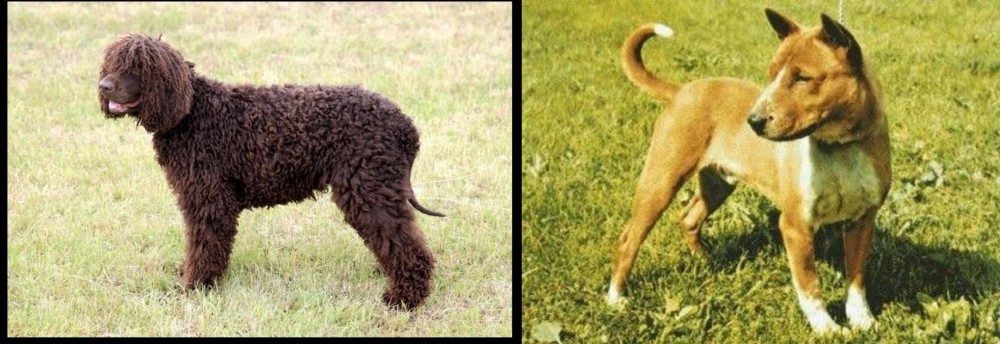 Irish Water Spaniel is originated from Ireland but Telomian is originated from Malaysia. Irish Water Spaniel may grow 11 cm / 5 inches higher than Telomian. Irish Water Spaniel may weigh 17 kg / 38 pounds more than Telomian. Both Irish Water Spaniel and Telomian has almost same life span. Irish Water Spaniel may have more litter size than Telomian. Both Irish Water Spaniel and Telomian requires Moderate Maintenance.
Irish Water Spaniel is originated from Ireland but Telomian is originated from Malaysia. Irish Water Spaniel may grow 11 cm / 5 inches higher than Telomian. Irish Water Spaniel may weigh 17 kg / 38 pounds more than Telomian. Both Irish Water Spaniel and Telomian has almost same life span. Irish Water Spaniel may have more litter size than Telomian. Both Irish Water Spaniel and Telomian requires Moderate Maintenance.
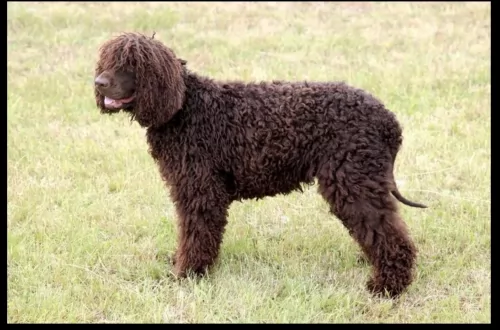 The Irish Water Spaniel is one of the larger spaniel types and also one of the oldest.
The Irish Water Spaniel is one of the larger spaniel types and also one of the oldest.
He is sometimes referred to as the Southern Irish Water Spaniel. Hailing from Ireland, the precise origins of the dog aren't altogether sure. It is believed that the dog came from other dogs from Persia and there are references to these water dogs from as early as 1600.
The modern breed was developed in Ireland in the 1830s. The breed's purpose is that of a hunter of waterfowl and he swims strongly.
The Irish Water Spaniel was recognized by the AKC in 1884. In 1890 the Irish Water Spaniel Club was formed.
 The Telomian, out of Malaysia is rare and the only dog bred in Malaysia that lives outside the country. The breed was originally called Village dog or Anjing Kampung in Malay. The Telo is still considered one of the rarest dogs in the world. They are considered as a possible missing link between the Australian Dingo and the African Basenji.
The Telomian, out of Malaysia is rare and the only dog bred in Malaysia that lives outside the country. The breed was originally called Village dog or Anjing Kampung in Malay. The Telo is still considered one of the rarest dogs in the world. They are considered as a possible missing link between the Australian Dingo and the African Basenji.
They were bred to kill vermin by indigenous people, the Orang Asli of Malasia. They have an amazing ability to climb bred into them because these indigenous people lived in stilt houses. Even as they kept the Theomian to hunt vermian, the Orang Asli believed dogs were evil spirits who would eventually turn on them.
In 1963, Dr. Orville Elliot, an anthropologist from the West, discovered the breed and named them the Telomian for the Telom River they lived near. He took a pair to the United States and by 1970 there was a Telomian Dog Club in the U.S. By 1973 another pair had been imported and it is thought that all the Telomians who live in the United States today are descendants of these two pairs.
Like the New Guinea Singing Dog and the Basenji, the Telo do not bark but rather have a unique howl. Being bred from wild dogs, the Telo is not fully domesticate and puppies need a lot of socialization. The Telomian is on the Dog Registry of America Inc and America’s Pet Registry but is not recognized by any pedigree registry.
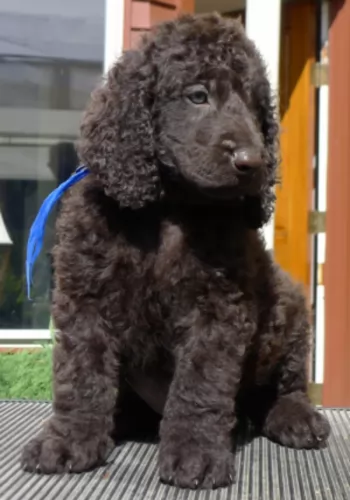 A peculiar feature of this dog is its hairless tail which is partly covered in curls which the rest is all but hairless, giving him the nickname of Rat Tail or Whip Tail.
A peculiar feature of this dog is its hairless tail which is partly covered in curls which the rest is all but hairless, giving him the nickname of Rat Tail or Whip Tail.
Looking much like a Poodle with his tight oily curls, the Irish Water Spaniel is a medium to large sized purebred dog, a robust, compact built dog with a skull which is shaped like a dome.
The muzzle is longish, the eyes dark brown and intelligent looking and the ears are long and floppy.
His hair is thick and curly and it sheds very little so that the dog is regarded as being hypoallergenic. The medium length coat is a dark brown, liver color with fairly tight curls that may even tend to cover the eyes.
It is interesting to note that he has webbed feet, which is useful for when the dog swims.He stands at roughly 51cm to 61cm and weighs between 25 to 30kg.
Temperament in any dog is affected by socialization and the way the human owner raises the dog. The Irish Water Spaniel is a water loving dog, being active and energetic.
He is an intelligent dog and easy to train and socialize. When trained he becomes such an obedient dog. He has also got a light-hearted side to him and is actually known to be quite amusing and clownish, providing plenty of laughs for you.
They make good family dogs, getting on well with children in the home as well as with other pets. They're also able to make good guard dogs, taking the protective roles seriously. He isn't an aggressive dog but he has a warning bark that can be a good warning to intruders.
 This is a somewhat unique looking breed. They are small dogs, sturdy, athletic dogs with short coat, a square body and a long back. Their coat is smooth and sable and the ticking is white. They often have black masks and purple tongues. They are about 15-18 inches in height and weigh about 18-28 pounds. Their head is well proportioned and they have erect ears, almond shaped eyes and deep chests.
This is a somewhat unique looking breed. They are small dogs, sturdy, athletic dogs with short coat, a square body and a long back. Their coat is smooth and sable and the ticking is white. They often have black masks and purple tongues. They are about 15-18 inches in height and weigh about 18-28 pounds. Their head is well proportioned and they have erect ears, almond shaped eyes and deep chests.
The Telo is still so undomesticated that the female only comes into estrus once a year in September to October. They have great command of their paws and can use them more like cats or racoons. They climb with them and hold toys, objects or food in them. This is related to their need to climb since homes were built on stilts in the jungles of Malaysia.
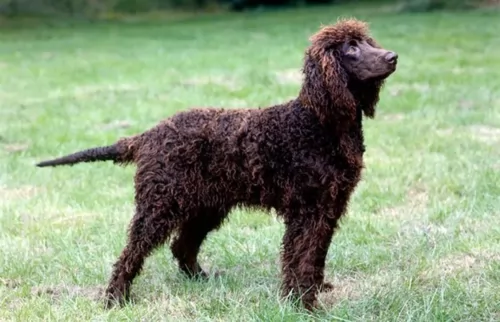 Your active Irish Water Spaniel just loves water so you can count him in whenever you go swimming. That is one characteristic of the Irish Water Spaniel – he just loves to be involved in all the action you're busy with.
Your active Irish Water Spaniel just loves water so you can count him in whenever you go swimming. That is one characteristic of the Irish Water Spaniel – he just loves to be involved in all the action you're busy with.
He makes an ideal family pet for an active family, and he will be a loyal and devoted pet who will provide a lot of fun to your family with his mischievous side.
He is confident, independent and strong willed so first time dog owners should bear this in mind. He is essentially just a fun loving, busy dog and if you make sure to exercise him well and make sure he is a participating member of your family, he'll be your most loving and devoted friend.
 2.Special talents – climbing ability, use of their paws, able to hunt their own food.
2.Special talents – climbing ability, use of their paws, able to hunt their own food.
3.Adaptability – they are not big so you would think apartment living would be ok but because of their energy and prey drive they really need a place to run.
 A generally healthy breed, the Irish Water Spaniel, just like with most other dogs, can fall prey to some of the more common dog ailments of which hip dysplasia is one.
A generally healthy breed, the Irish Water Spaniel, just like with most other dogs, can fall prey to some of the more common dog ailments of which hip dysplasia is one.
Bone and joint problems like this can lead to lameness even in young dogs.
Eye diseases are also a problem, and cataracts can form in the eye, particularly when the dog is older and create a cloudy look to the eye. It's not painful for the dog.
Hypothyroidism, a treatable hormonal disorder is another disease worth being aware of.
 This is a somewhat unique looking breed. They are small dogs, sturdy, athletic dogs with short coat, a square body and a long back. Their coat is smooth and sable and the ticking is white. They often have black masks and purple tongues. They are about 15-18 inches in height and weigh about 18-28 pounds. Their head is well proportioned and they have erect ears, almond shaped eyes and deep chests.
This is a somewhat unique looking breed. They are small dogs, sturdy, athletic dogs with short coat, a square body and a long back. Their coat is smooth and sable and the ticking is white. They often have black masks and purple tongues. They are about 15-18 inches in height and weigh about 18-28 pounds. Their head is well proportioned and they have erect ears, almond shaped eyes and deep chests.
The Telo is still so undomesticated that the female only comes into estrus once a year in September to October. They have great command of their paws and can use them more like cats or racoons. They climb with them and hold toys, objects or food in them. This is related to their need to climb since homes were built on stilts in the jungles of Malaysia.
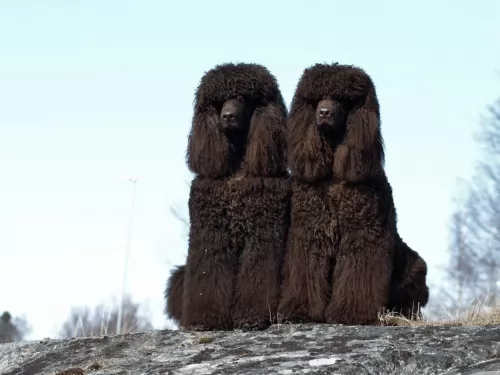 Your Irish Water Spaniel requires quite a bit of grooming that will involve his coat, his nails, his teeth and his ears. The double coat doesn't shed much so it can be easily maintained by brushing the coat twice a week.
Your Irish Water Spaniel requires quite a bit of grooming that will involve his coat, his nails, his teeth and his ears. The double coat doesn't shed much so it can be easily maintained by brushing the coat twice a week.
It can help your water spaniel to look good by sending him in to a doggy grooming parlor to have his curls neatened. This is a dog that loves water and swimming, and you will need to check the inside of his ears for dampness, wax build-up and debris. This can all combine to cause nasty ear infections.
The dog is energetic and will need to be exercised. Take him for walks, play ball games with him and allow him to go on hikes with you or to go swimming. He loves being involved in all your activities as he is a social, active dog.
Highly energetic, it will be important to feed your Irish Water Spaniel with food that enhances his energy levels. There are some good quality commercially manufactured dog foods on the market. Choose one that caters for active, athletic dogs such as the Irish Water Spaniel.
Dry kibble is more recommended to prevent canine tooth decay. Mix in some home cooked foods from time to time such as cooked chicken, rice, pasta and vegetables and try to include some raw meat every now and then as well. Make sure he has constant access to fresh, cool water.
 This is an isolated, rare breed with very few known genetic health issues. They tend to be very healthy and athletic if well cared for and fed properly. The only issues they are known to have throughout the breed are hip and elbow dysplasia. Both of these issues we know can lead to arthritis and or lameness. Individual dogs may face other challenges such as allergies and obesity, but as a breed they are extremely healthy, much as the dingo and other wild dogs remain healthy.
This is an isolated, rare breed with very few known genetic health issues. They tend to be very healthy and athletic if well cared for and fed properly. The only issues they are known to have throughout the breed are hip and elbow dysplasia. Both of these issues we know can lead to arthritis and or lameness. Individual dogs may face other challenges such as allergies and obesity, but as a breed they are extremely healthy, much as the dingo and other wild dogs remain healthy.
Don’t overfeed them and watch what they might eat or try to eat when outside. They are used to feeding themselves in the wild and the domesticated dogs retain that prey drive and desire to eat what they catch.